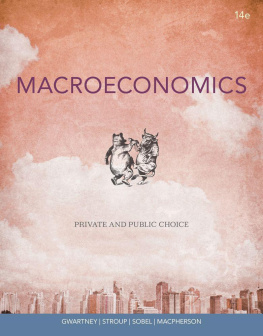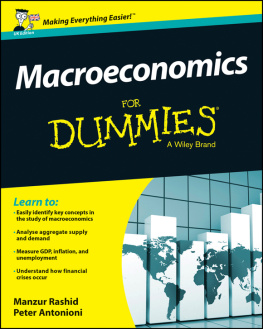Keys to Economic Prosperity
These keys to the economic prosperity of a nation are highlighted throughout the text.
1. Human Ingenuity . Economic goods are the result of human ingenuity and action; thus, the size of the economic pie is variable, not fixed. [Economics ]
2. Private Ownership . Private ownership provides people with a strong incentive to take care of things and develop resources in ways that are highly valued by others. [Economics ]
3. Gains from Trade . Trade makes it possible for individuals to generate more output through specialization and division of labor, large-scale production processes, and the dissemination of improved products and production methods. [Economics ]
4. Invisible Hand Principle . Market prices coordinate the actions of self-interested individuals and direct them toward activities that promote the general welfare. [Economics ]
5. Profits and Losses . Profits direct producers toward activities that increase the value of resources; losses impose a penalty on those who reduce the value of resources. [Economics ]
6. Competition . Competition motivates businesses to produce efficiently, cater to the views of consumers, and search for innovative improvements. [Economics Chapter 22; Microeconomics ]
7. Entrepreneurship . The entrepreneurial discovery and development of improved products and production processes is a central element of economic progress. [Economics Chapter 23; Microeconomics ]
8. Productivity and Earnings . In a market economy, productivity and earnings are closely linked. In order to earn a large income, one must provide large benefits to others. [Economics Chapter 26; Microeconomics ]
9. Innovation and the Capital Market . If the potential gains from innovative ideas and human ingenuity are going to be fully realized, it must be relatively easy for individuals to try their innovative and potentially ingenious ideas, but difficult to continue if the idea is a bad one. [Economics Chapter 27; Microeconomics ]
10. Price Stability . Maintenance of price stability is the essence of sound monetary policy; price stability provides the foundation for both economic stability and the efficient operation of markets. [Economics ]
11. International Trade . When people are permitted to engage freely in international trade, they are able to achieve higher income levels and living standards than would otherwise be possible. [Economics ]
12. Role of Government . Governments promote economic progress when they protect individuals and their property, enforce contracts impartially, provide access to money of stable value, avoid high taxes and excessive regulation, and foster competitive markets and free international trade. [Economics ]
MICROECONOMICS
PRIVATE AND PUBLIC CHOICE
FOURTEENTH EDITION
Australia Brazil Japan Korea Mexico Singapore Spain United Kingdom United States
MICROECONOMICS
PRIVATE AND PUBLIC CHOICE
FOURTEENTH EDITION
iStockphoto.com /sorendls
JAMES D. GWARTNEY
Florida State University
RICHARD L. STROUP
Montana State University
RUSSELL S. SOBEL
West Virginia University
DAVID A. MACPHERSON
Trinity University, San Antonio TX
Australia Brazil Japan Korea Mexico Singapore Spain United Kingdom United States
Macroeconomics: Private and Public Choice, Fourteenth Edition
James D. Gwartney
Richard L. Stroup
Russell S. Sobel
David A. Macpherson
Vice President of Editorial, Business: Jack W. Calhoun
Editor-in-Chief: Joe Sabatino
Executive Editor: Michael Worls
Senior Acquisitions Editor: Steve Scoble
Senior Development Editor: Susanna C. Smart
Editorial Assistant: Allyn Bissmeyer
Senior Marketing Communications Manager: Sarah Greber
Senior Marketing Manager: John Carey
Associate Marketing Manager: Betty Jung
Marketing Coordinator: Suellen Ruttkay
Director, Education Production: Barbara Fuller Jacobsen
Content Project Manager: Emily Nesheim
Media Editor: Sharon Morgan
Manufacturing Planner: Kevin Kluck
Production Service: MPS, a Macmillan Company
Senior Art Director: Michelle Kunkler
Cover and Internal Designer: Stratton Design
Cover Images: iStockphoto.com /sorendls; iStockphoto.com /nicoolay
Rights Acquisition Director: Audrey Pettengill
Senior Rights Acquisition Specialist (images): Deanna Ettinger
Rights Acquisition Specialist (text): Sam Marshall
2013, 2011 South-Western, Cengage Learning
ALL RIGHTS RESERVED. No part of this work covered by the copyright herein may be reproduced, transmitted, stored, or used in any form or by any means graphic, electronic, or mechanical, including but not limited to photocopying, recording, scanning, digitizing, taping, web distribution, information networks, or information storage and retrieval systems, except as permitted under Section 107 or 108 of the 1976 United States Copyright Act, without the prior written permission of the publisher.
For product information and technology assistance, contact us at Cengage Learning Customer & Sales Support, 1-800-354-9706
For permission to use material from this text or product, submit all requests online at www.cengage.com/permissions
Further permissions questions can be emailed to
Exam View is a registered trademark of eInstruction Corp. Windows is a registered trademark of the Microsoft Corporation used herein under license. Macintosh and Power Macintosh are registered trademarks of Apple Computer, Inc. used herein under license.
2013 Cengage Learning. All Rights Reserved.
Library of Congress Control Number: 2011943655
ISBN-13: 978-1-111-97062-8
ISBN-10: 1-111-97062-9
South-Western
5191 Natorp Boulevard
Mason, OH 45040
USA
Cengage Learning products are represented in Canada by Nelson Education, Ltd.
For your course and learning solutions, visit www.cengage.com
Purchase any of our products at your local college store or at our preferred online store www.cengagebrain.com
Printed in the United States of America
1 2 3 4 5 6 7 15 14 13 12 11
Kindle textbooks are functionally equivalent to the print textbook. In some cases, individual items such as ancillary images or multimedia have been removed for digital delivery due to rights restrictions.
Brief Contents
Contents
RELATIONSHIP BETWEEN MAIN EDITION AND THE MACRO/MICRO EDITIONS












